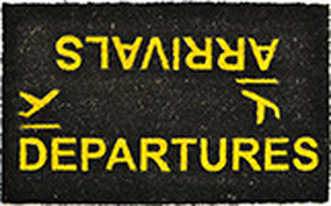
Jacob ben Wolf Kranz of Dubno (1740-1804) was a chasidic preacher from Lithuania known as the "Dubner Maggid." He explained the difference with a charming tale. The story goes like this:
A pious man had a son whose mother died after the boy was born. The man remarried, but the boy's stepmother was cruel to him and the hard feelings between them became worse as the boy grew toward adulthood. One day, the man met an exceptional young woman in his travels whom he thought would make a wonderful wife for his son. The man met with the young woman's father and the two men arranged for their children to marry. When the man returned home to his son, he shared the happy news with him. The son was delighted to learn that he would soon leave the house of his stepmother. Preparations were made for father and son to travel together to the town of the son's bride-to-be. Not long after they began the trip, the son asked the driver, "How many miles have we now traveled?" The driver answered that they had traveled three miles. A while later, the son asked again, "How far have we traveled now?" The driver told him that it had been ten miles. Some time later, the father asked the driver, "How many more miles until we reach our destination?" and the driver told him that they had five miles to go.
The son asked his father, "Why is it that I asked how many miles we have traveled, but you asked how many miles we have yet to go?" The father said, "Your mind is only focused on getting far from your stepmother. I, on the other hand, am thinking about the joy you will experience once you meet your bride. You are counting the miles since we left. I am counting the miles until we arrive."
This is the reason why the Torah says that Moses wrote down "the starting points of the Israelites' journeys," but the Israelites thought more about "the journeys of their starting points." Moses thought about the start of the Israelites' journey, but also about where they were headed. He knew that a land of milk and honey awaited them. For the Israelites, though, the purpose of the journey was getting away from Egypt. They only wanted to know how much distance was between them and their suffering.
All of life is travel from one place to another. The journey takes us from the past we have experienced to a future that is still a mystery. If our minds are overflowing with thoughts about the places behind us, we might forget to be mindful of the adventure and joy that are ahead. If, when we reach our destination, our thoughts are still on the past, we might miss our arrival entirely.
We all know where we have been in life and we try to understand how our experiences have shaped us, but life cannot really be lived looking only in the rear-view mirror. The challenge is to accept what has been, and yet to live in the present with optimism for the future. In this way we can learn from our past without being defined by it. Our destiny is not ruled by our history.
Last month, I left a community that I appreciate and love – not an "Egypt" for me at all! – to come to a congregation that is my new home and a source of joy. So far, I have had only my first tastes of the milk and honey that flow here, but I have found them to be delicious. I am so grateful for the journey that has led me to Temple Sinai in Cranston, Rhode Island.
While I do miss and think about the places and people I have left behind, those thoughts cannot be my main focus right now. I need to be here now in body, mind and spirit. I take comfort in knowing that the community I have left is now on its own magnificent journey without me. We are part of each other's pasts, and that allows us to experience new beginnings – things we would miss if we were to stay stuck in the past.
What of you? What memories, images, nostalgia and regret do you carry around with you from your past? Do you mark your journeys in life according to the miles you have logged since past departures, or according to the unseen destinations that lie ahead? Wherever you are, make sure that you walk the path ahead of you with eyes raised in optimism and hope. You never now what is to come.
Other Posts on This Topic:
Mas'ei: The Torah of Now
Lech Lecha: "Get Yourself Going"

 RSS Feed
RSS Feed
